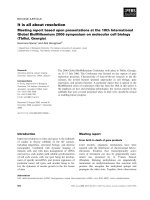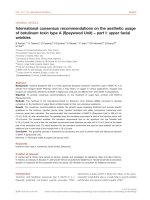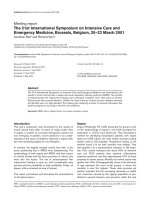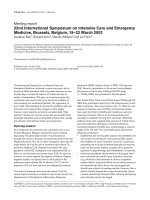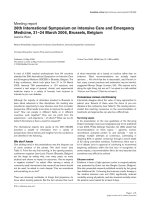11th International Frumkin Symposium on Electrochemistry
Bạn đang xem bản rút gọn của tài liệu. Xem và tải ngay bản đầy đủ của tài liệu tại đây (1.25 MB, 10 trang )
11th International Frumkin Symposium on Electrochemistry
October 19-23, 2020
Moscow, Russia
2nd Announcement and Call for Papers
Invitation to the 11th International Frumkin Symposium
The organizing committee of the symposium warmly invites you for participation in this conference devoted to all
areas of modern electrochemistry and adjacent disciplines, in honor of the 125 th anniversary of the birth of famous
electrochemist Alexander N. Frumkin.
Organizing Institutions:
Russian Academy of Sciences
Division of Chemistry and Material Sciences
Ministry for Science and Higher Education
of the Russian Federation
Frumkin Institute of Physical Chemistry
and Electrochemistry
Lomonosov Moscow State University
Department of Chemistry
Editorial Board of the Russian
Journal of Electrochemistry
Sponsoring Institutions:
Sponsorship and financial support by foundations and companies are gratefully acknowledged.
Russian Academy of Sciences Headquarters: proposed venue for the Frumkin Symposium
Organizing Committee of Symposium
Chair: Aslan Yu. Tsivadze
Co-Chairs: Vladimir N. Andreev, Evgeny V. Antipov, Oleg V. Batishchev, Yury A. Dobrovolsky, and
Mikhail A. Vorotyntsev
Scientific Secretary: Alexander A. Nekrasov
Members:
Boris M. Grafov, Alexey D. Davydov, Alexander M. Skundin, Oxana L. Gribkova, Viktor V. Emets, Yury A. Ermakov,
Vitaly A. Grinberg, Alexey L. Klyuev, Natalia V. Nekrasova, Anatoly E. Antipov, and Andrey D. Gorobchenko
International Advisory Board
Sergei M. Aldoshin (Chernogolovka, Russia)
Patrizia Mussini (Milano, Italy)
Hans-Jürgen Apell (Konstanz, Germany)
Alexander P. Nemudryi (Novosibirck, Russia)
Sergey .I. Bredikhin (Chernogolovka, Russia)
John Newman (Berkeley, USA)
Yulia G. Budnikova (Kazan', Russia)
Alain Pailleret (Paris, France)
Elena Ferapontova (Aarhus, Denmark)
Rasa Pauliukaite (Vilnius, Lithuania)
Vladimir E. Guterman (Rostov, Russia)
Mikhail A. Pletnev (Izhevsk, Russia)
Tibor Hianik (Bratislava, Slovakia)
Elena R. Savinova (Strasbourg, France)
A. Robert Hillman (Leicester, UK)
Nina V. Smirnova (Novocherkassk, Russia)
Ivan A. Kazarinov (Saratov, Russia)
Кeith J. Stevenson (Skolkovo, Russia)
Vladislav V. Kharton (Aveiro, Portugal)
Sergei Sukharev (College Park, USA)
Alexey .R. Khokhlov (Moscow, Russia)
Sergio Trasatti (Milano, Italy)
Vladimir A. Kolesnikov (Moscow, Russia)
Vessela Tsakova (Sofia, Bulgaria)
Vasiliy L. Kornienko (Krasnoyarsk, Russia)
Nikolay F. Uvarov (Novosibirsk, Russia)
Andrey P. Kurbatov (Almaty, Kazakhstan)
Victoria Vitkova (Sofia, Bulgaria)
Fred Lisdat (Wildau, Germany)
Vladimir M. Volgin (Tula, Russia)
Valery V. Lunin (Moscow, Russia)
Alexander V. Vvedenskii (Voronezh, Russia)
Tatiana V. Magdesieva (Moscow, Russia)
Alain Walcarius (Nancy, France)
Sergey A. Martemianov (Poitiers, France)
Victor I. Zabolotsky (Krasnodar, Russia)
Konstantin N. Mikhelson (Saint-Petersburg, Russia)
Yurii P. Zaikov (Ekaterinburg, Russia)
Yury A. Zolotov (Moscow, Russia)
Symposium Programming
The symposium will be implemented as plenary lectures, oral sessions of sections (including keynote talks, invited
oral speakers and oral presentations) as well as poster sessions.
The official language of the symposium is English.
Plenary lecturers
Juan M. Feliu, University of Alicante, Spain
"Electron-transfer reactions as local charge probe on platinum single crystal electrodes".
Peter Pohl, Johannes Kepler University, Linz, Austria
"Single file water transport"
Patrik Schmuki, University of Erlangen, Germany
“Self-organizing electrochemistry: Formation and properties of TiO2 nanotubes and similar nanostructures”
Jean-Marie Tarascon, College de France, Paris, France
"The duality materials science electrochemistry for better batteries"
Zhong-Qun Tian, Xiamen University, China
"New approach on interfacial structure of water/single-crystal electrode by vibrational spectroscopy and quantitative
theoretical method"
Keynote lecturers
Christian Amatore, Ecole Normale Superieure ULM and Sorbonne Universite, Paris, France (expected)
Plamen Atanassov, University of California, Irvine, USA (confirmed)
Doron Aurbach, Bar-Ilan University, Israel (confirmed)
Program Committee
Chair: Mikhail A. Vorotyntsev, Lomonosov Moscow State University, Russia
Scientific Secretary: Alexander A. Nekrasov, Frumkin Institute of Physical Chemistry and Electrochemistry, Russian
Academy of Sciences, Moscow, Russia.
List of Sections
Section 1: Fundamental Aspects of Electrochemistry
Section 2: Electrochemistry of Materials
Section 3: Electrochemical Energy Conversion and Storage
Section 4: Bioelectrochemistry and Biomedical Applications of Electrochemistry
Section 5: Electroanalysis
Section 6: Electrochemistry of Ionically Conducting Media
Section 7: Electrochemical Methods in Nuclear Chemistry: Problems and Solutions
Section 8: Electrochemical Corrosion and Protection of Metals
Section 9: Student's section
Section 1: Fundamental Aspects of Electrochemistry
Section organizers:
Richard G. Compton (Coordinator), Oxford University, UK
Christian Amatore, Ecole Normale Superieure ULM and Universite Pierre et Marie Curie, Paris, France
Yan Xia Chen, University of Science and Technology, Hefei, China
Angela Molina, University of Murcia, Spain
Oleg A. Petrii, Lomonosov Moscow State University, Russia
Viktor A. Safonov, Lomonosov Moscow State University, Russia.
Scope of the section:
Papers covering all aspects of fundamental electrochemistry are welcome.
Possible topics of interest may include the following area: electrified interfaces; charge transfer thermodynamics,
kinetics and mechanisms; micro- and nano-interfaces; single entities; molecular electrochemistry; electrochemical
modeling; room temperature ionic liquid interfaces; 'single' molecule redox cycling; etc.
Section 2: Electrochemistry of Materials
Section organizers:
Veniamin V. Kondratiev, Saint-Petersburg State University, Russia
Pawel J. Kulesza, University of Warsaw, Poland
Monica Santamaria (Coordinator), Università di Palermo, Italy
Vincent Vivier, Sorbonne Université, Paris, France
Andrey B. Yaroslavtsev, Institute of General & Inorganic Chemistry, Russian Academy of Sciences, Moscow, Russia
Scope of the section:
Section 2 invites presentations related to all areas of Electrochemistry of Materials, i.e. to both the electrochemical
synthesis of novel materials and their applications to perform chemical or/and electrochemical transformations at
their surface or inside the electrode.
Contributions are welcome in, but not limited to, various types of electrochemical materials such as electrocatalysts,
sensor materials, electrochromic materials, materials for photovoltaics, energy storage materials , energy conversion
materials, coatings for corrosion protection, materials with mixed conductivity, electron-conducting polymers, redox
polymers, inorganic electroactive solids, nanocomposite electrode materials, functionalized electrode surfaces.
Special focus on the design and manufacture of next generation electrochemical materials and the consideration of
electrode reactions and charge transfer processes on the electrode surfaces, charge –discharge processes in the
bulk of electroactive materials (solids and polymers) as well as at the interfaces between components of composite
materials.
Section 3: Electrochemical Energy Conversion and Storage
Section organizers:
Evgeny V. Antipov, Lomonosov Moscow State University, Russia
Plamen Atanassov, University of California, Irvine, USA
Doron Aurbach, Bar-Ilan University, Israel
Jun Chen, Nankai University, China
Tatiana L. Kulova (Coordinator), Frumkin Institute of Physical Chemistry and Electrochemistry, Russian Academy of
Sciences, Moscow, Russia
Scope of the section:
Section 3 covers all areas of electrochemical phenomena related to energy conversion and storage, in particular:
- Primary cells, batteries, metal-ion batteries
- Batteries for tomorrow’s world
- Fuel cells, flow batteries and electrolyzers
- Supercapacitors
- Electrochemical solar cells and photo-electrochemistry
- Novel materials and devices for energy conversion and storage
Section 4: Bioelectrochemistry and Biomedical Applications of Electrochemistry
Section organizers:
Oleg V. Batishchev (Coordinator), Frumkin Institute of Physical Chemistry and Electrochemistry, Russian Academy of
Sciences, Moscow, Russia
Peter Pohl, Johannes Kepler University, Linz, Austria
Jens Ulstrup, Technical University of Denmark, Lyngby, Denmark
Joshua Zimmerberg, Eunice Kennedy Shriver National Institute of Child Health and Human Development, National
Institutes of Health, Bethesda, MD, USA
Scope of the section:
Bioelectrochemistry, bioenergetics, ion channels, interfacial phenomena in biological systems, charge transfer in
biology, redox reactions in living systems, electrochemistry of cell and artificial membranes, electrostatic effects in
protein-lipid interactions, interaction of polyelectrolytes with biological membranes, cellular membrane electrical
potentials, electroporation, biomedical applications of electrochemistry.
Section 5: Electroanalysis
Section organizers:
Genady A. Evtugyn, Kazan Federal University, Russia
Arkady A. Karyakin (Coordinator), Lomonosov Moscow State University, Russia
Alexander Kuhn, University of Bordeaux, France
Daniel Mandler, University of Jurusalem, Israel
Ulla Wollenberger, University of Potsdam, Germany
Scope of the section:
Fundamental and applied aspects of electroanalytical chemistry including sensors and biosensors.
Section 6: Electrochemistry of Ionically Conducting Media
Section organizers:
Laurent Bazinet, Laval University, Canada
Maarten Biesheuvel, Wetsus, Leeuwarden, Netherlands
Yury A. Dobrovolsky, Institute for Problems of Chemical Physics, Russian Academy of Sciences, Chernogolovka,
Russia
Joachim Maier, Max Planck Institute for Solid State Research, Stuttgart, Germany
Victor V. Nikonenko (Coordinator), Kuban State University, Krasnodar, Russia
Truls Norby, University of Oslo, Norway
Marcin Opallo, Institute of Physical Chemistry, Polish Academy of Sciences, Warsaw, Poland
Scope of the section:
Section 6 covers all kinds of electrochemical phenomena in the systems involving ionically conducting media:
- Organic and polymeric materials: ion-exchange and electrotransport properties, reverse osmosis and nanofiltration
membranes, separative porous matrix membranes
- Inorganic solid materials with ionic and ionic-electron conductivity, e.g. solid electrolytes, ionic intercalation media,
etc.
- Composite organic-inorganic materials with ionic conductivity
- Ionic liquids, molten electrolytes
- Nano- and microfluidic systems
- Experimental and theoretical methods
Section 7: Electrochemical Methods in Nuclear Chemistry: Problems and Solutions
Section organizers:
Boris F. Myasoedov (Coordinator), Frumkin Institute of Physical Chemistry and Electrochemistry, Russian Academy
of Sciences, Moscow, Russia
Maciej Chotkowski, University of Warsaw, Poland
Stepan N. Kalmykov, Lomonosov Moscow State University, Russia
Sergey A. Kulyukhin, Frumkin Institute of Physical Chemistry and Electrochemistry, Russian Academy of Sciences,
Moscow, Russia
Bertrand Morel, ORANO, Paris, France
Masaki Ozawa, Tokyo Institute of Technology, Japan
Scope of the section:
Main directions:
- High-temperature electrochemistry of lanthanides and actinides in melts
- Electrochemistry of radioactive elements in various oxidation states
- Electrochemical methods in the processing of spent nuclear fuel and radioactive waste
Section 8: Electrochemical Corrosion and Protection of Metals
Section organizers:
Yury I. Kuznetsov (Coordinator), Frumkin Institute of Physical Chemistry and Electrochemistry, Russian Academy of
Sciences, Moscow, Russia
Аndrey I. Marshakov, Frumkin Institute of Physical Chemistry and Electrochemistry, Russian Academy of Sciences,
Moscow, Russia
Yudit Telegdi, Research Centre for Natural Sciences, Hungarian Academy of Sciences, Budapest, Hungary
Vincent Vivier, Sorbonne Université, Paris, France
Мikhail L. Zheludkevich, Institute of Materials Research, Helmholtz-Zentrum Geesthacht, Germany
Scope of the section:
Mechanisms of electrochemical corrosion of metals. Protective coatings. Corrosion inhibitors and passivation of
metals. Electrochemical protection of metals.
Sessions of this section will be carried out partially in the course of satellite conference: II conference "Fundamental
and Applied Aspects of Electroplating, Electroless Plating, and Protection of Metals and Alloys" dedicated to Yury M.
Polukarov. This conference will be held in Moscow on October 14–16, 2020. Applications for participation in this
event should be made at the following website:
where more detailed information about this conference is available.
Other contributions related to this area can also be submitted to this section or other sections of the symposium and
presented in the course of their sessions.
Section 9: Student's section
The special "Student's session" will be organized within the symposium period, where young scientists under 30
(having no PhD degree) exposing (one or two) posters during the main event, will present short oral talks.
Publications
The Book of Abstracts will have ISBN number and it will be indexed in the Russian Science Citation Index (RSCI)
data base. The Book of Abstracts will be available at the opening of the symposium in both the electronic version (for
all participants) and paper form (for the participants who will make an order, see at the symposium website after May
22, 2020).
A special issue of “Elektrokhimiya” (“Russian Journal of Electrochemistry”) will be published. Special issues in other
international journals are in the stage of negotiations.
Symposium Venue and Schedule
The symposium will be held in halls of the Presidium of the Russian Academy of Sciences in Moscow, Leninskii
prospect 32A located in the close vicinity of the "Leninsky Prospect" stations of the Moscow Underground System
("Metro") and the “Ploshchad' Gagarina (Gagarin Square)” station of the Moscow Central Circle railway (“MCC”).
Arrivals of participants and welcome party are expected on October 19.
Sessions of the Symposium will take place on October 20-23.
Recommended departure date: October 24 or later.
General Information
Moscow can be easily reached via its 4 international airports or its railway stations which are connected with the
downtown by express trains and buses. There are numerous accommodation options which may found via internet.
The Organizing Committee of the Symposium will ensure formal invitation letters, needed e.g. for getting the Russian
visa to enter the country, for all participants (as well as their accompanying persons) who will make all obligatory
steps: registration via the symposium site, submission of the abstract(s) and payment of the conference fee.
Participants might also use facilities by the symposium organizing partner (accommodation, personal transportation
from and to the airport, visa application, cultural program, etc.) which may be reached via redirection from the
symposium website: .
Registration and Abstract Submission
Registration and abstract submission is expectedly to be opened in March soon; the date will be announced at the
symposium site.
Those who plan to make presentation(s) at the symposium (up to two presentations of the oral or/and poster type(s)
per presenting author) are invited to create a personal account via the symposium website () in
order to fill in the registration form and to submit abstract(s) of presentation(s):
- Go to the symposium website ;
- Find and press “Registration” button (you will be redirected to the site of our symposium organizing partner
MKCongress />- Choose “Create account and submit contribution” option and follow the registration instructions. Payment of
the conference fee is not needed at this stage.
- IMPORTANT: Immediately after creation of your account an E-mail message(s) of confirmation will be sent
from the address to all your E-mail addresses you have entered (including the
reserve ones). If you do not receive this confirmation please check the correctness of the E-mail address(es)
you entered. Also, please check your “SPAM” folder(s) for the above confirmation message.
After completion of the registration procedure (with the receipt of the above confirmation message) you can either
proceed with submission of your abstract(s) or logout and submit your abstract(s) later.
To submit an abstract:
- Go again to the symposium website;
- Find and press “Abstract's Template” button in order to load the template;
- Prepare your abstract(s) in conformity with the Template. Each Presenting Author is eligible for submitting
up to two abstracts (two "Oral", or two "Poster", or "Oral" and "Poster" presentations). Each Absentee
Author (who is interested in publication of his/her abstract(s) in the symposium booklet but who does not
want to attend the Symposium personally) can submit for publication in the Symposium Book of Abstracts up
to two abstracts;
- Go again to the symposium website;
- Find and press “Abstract's Submission” button (you will be redirected again to the MKCongress site
/>- Login into your account if you have already created it;
- Choose “Your Submissions” option and follow instructions on abstract's submission. Please indicate your
preference among the "Oral", "Poster" or “Publication” forms of your submission(s). Please choose “Oral” if
your presentation is invited by the Organizing Committee as “Plenary”, “Keynote”, or “Invited Oral” lecturer.
Absentee Author (who does not want to attend the Symposium personally) should choose “Publication”
type of submission.
Payment of the conference is not needed at this stage.
Young Scientists (age under 30, no PhD degree), who are to deliver ONLY POSTER presentation(s) are eligible for
submitting ONE of these contributions ALSO for a SHORT ORAL presentation within the Student Oral Session
(Section 9).
To claim such a participation in the Student Oral Session one should include words “Student Oral Session” into the
text field: “Remark/Message from…” in the course of submission of its abstract at the Registration site.
Applications for such short oral presentations within Section 9 will be evaluated by the Organizing Committee of the
principal section (from 1 to 8) where this poster contribution is submitted.
Email messages confirming the abstract(s) submission will be sent automatically from the
address to your email address(es) (including the reserve email addresses) indicated in the course of your registration
procedure. Please ensure that they will not be placed into the “Spam” folder of your e-mail program/server.
Recommended period of the registration and abstract submission: till April 30, 2020. Definitive deadlines for
submission (different for "Oral" and "Poster" presentations) will be announced later at the Symposium website.
Notification on the status of a presentation
Every abstract submitted before the definitive deadline for oral presentations will be considered by the committee of
the corresponding section of symposium which will attribute a status (keynote, invited oral, oral or poster) of the
presentation.
The decisions on the abstract's status will be sent to the author's email address(es) as well as announced at the
symposium website (section "Registration/Submission") by May 31, 2020.
The presentations submitted after this deadline can only be accepted for exposition in the poster form.
Technical information on oral and poster presentations at the Symposium will be available later at the Symposium
website.
Conference fee and its payment
Expected conference fees of participants of the Frumkin Symposium:
200 euro - for a Regular participant;
100 euro - for a Young scientist (under 30).
15 euro - per each abstract submitted by an Absentee participant (not more than two abstracts per participant).
Regular or young scientist’s conference fee covers participation in the symposium, presentation of one or two
contributions and the publication of their abstracts in the Book of Abstracts.
Definitive size of conference fees and payment deadlines as well as the description of the payment procedure will be
announced on the symposium website by May 31, 2020.
Fees will be additionally reduced (compared to the above values) in the case of expected significant support from
national sources.
The deadline for the early-bird conference fee payment will be June 20, 2020. Payments via credit cards are
possible.
The deadline for payment of the conference fees by the authors of Oral presentations will be announced in the
Notification letter and at the symposium website by May 31, 2020.
Contacts
Symposium website:
Secretariat of Symposium: Alexander A. Nekrasov
Tel. +7 495 952 24 28. Fax +7 495 952 53 08
Frumkin Institute of Physical Chemistry and Electrochemistry, Russian Academy of Sciences,
Leninskii prospect 31, Bld. 4, Moscow 119071, Russia
Technical questions on Registration/Abstract submission procedures: please address to
Important Dates
Recommended deadline for abstract(s) submission:
Notification on the acceptance of a presentation for participation
in the Symposium and on its status:
Notification on the deadline for the conference fee payment
by the authors of Oral presentations
Early-bird conference fees are applicable until:
Welcome party
Sessions of the symposium
Recommended departure date
April 30, 2020
May 31 2020
May 31, 2020.
June 20, 2020
October 19, 2020
October 20-23, 2020
October 24, 2020 or later
